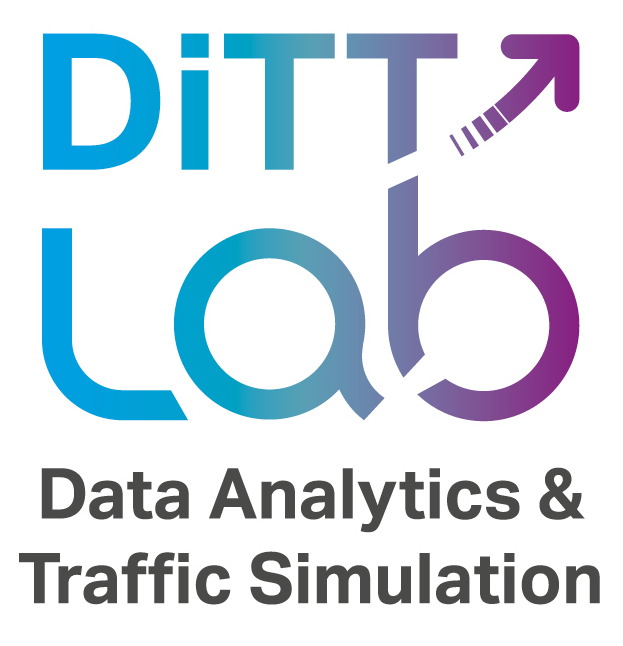Our Mission
We find transportation a fascinating phenomenon. Without it, society as we know it is simply not possible. But transportation is also a big contributor to some of the largest problems on our planet today. The mission of DiTTLAB is to bring together students, researchers and practitioners from multiple disciplines to work with large amounts of data to develop the knowledge, models and tools to unravel, estimate and predict the complex and dynamic travel and traffic patterns, to support the design and management of efficient, safe, and sustainable transportation systems. Our mission is to explore the underlying transport research questions on the interface of (big) data, network modeling and simulation, and to do so along several key principles.
We believe in open science and in open-sourcing the tools and techniques we develop. We believe in an open and stimulating work place, where collaboration is valued as much as individual excellence, and in which talent and diversity is recognised and celebrated. We value creative conceptualists, practical engineers, skeptical theorists, thoughtful experimentalists, mathematical wizards and computational geeks, because they all have invaluable knowledge and skills to offer. We believe in trust and a strong sense of community. We believe that making mistakes is a crucial driver for learning and that every one learns differently. We believe that doing research means learning together and thus sharing both successes and mistakes. Finally, we are engineers as much as we are scientists. We want our research to have impact. We want our models and tools to support a transition to safer, cleaner and more efficient transport systems.
Research Vision & Strategy
Traffic and transport flows are the result of millions of people interacting over smaller and larger spatial and temporal scales. Understanding these dynamics is an empirical science in which theories and models are as good as the evidence for them. In transportation this evidence has always been limited, however, this is rapidly changing, with huge amounts of data from many sensors and sources (infrastructure-bound, open-data, smart phones, vehicles, etc.) becoming available for research. Virtually all research in DiTTLAB uses large amounts of data which we store in our own cloud environment. Making sense of these data, i.e. turning them into meaningful information, requires interdisciplinary research, in which traffic engineers and scientists work together with data scientists, control and computer scientists, psychologists and many more. In DiTTLAB, we collaborate along three intertwined interdisciplinary themes.
- First, we focus on hybrid approaches that combine simulation model-based with advanced data driven approaches for estimating and predicting traffic patterns. For example, we use machine learning methods to unravel and estimate the large-scale dynamics of traffic demand and supply, which both help us to formulate and validate better simulation models.
- Second, we consider integrated multi-modal transport patterns, that is, we apply our techniques on both road and public transport networks and systems.
- Finally, we consider the transportation system at multiple levels of scale: at the microscopic level (individual behaviour); at the network level (reservoir modelling) and in between (on corridors). Describing transportation at multiple levels of scales forces one to understand much better the assumptions and limitations of our knowledge at each of those scale levels. As it turns out, sometimes you see more by zooming out.
The bigger picture
DiTTLAB is one of Research Labs within the Transport & Planning Department (T&P) at the Faculty of Civil Engineering and Geosciences (CEG). We work closely together with many other labs in T&P: the Smart Public Transport Lab, the Traffic and Transportation Safety Lab; the Electric and Automated Research Lab and the Freight and Logistics Lab.
DiTTlab foundations
The Data Analytics and Traffic Simulation Lab (DiTTlab) is the natural follow-up project of Regiolab-Delft, in which for over 15 years we have collected, archived and used huge amounts of traffic data, which can still be accessed at the regiolab-delft.nl website. Examples of project in which we collect, process and visualise data can be found on the research projects page. DiTTLAB was the central theme in the inaugural speech of Hans van Lint, accepting his Antonie van Leeuwenhoek Chair in Traffic Simulation and Computing (download the NL versie or UK version of his inaugural speech of April 2014.
Our contact information
E-mail:
Hans van Lint (j.w.c.vanlint@tudelft.nl); appointments via: secr-tp-citg@tudelft.nl)
Simeon Calvert (s.c.calvert@tudelft.nl)
Phone:
+31 (0)15 278 5061
Address:
Delft University of Technology
Faculty of Civil Engineering and Geosciences
Stevinweg 1
2628 CN, Delft
Room 4.11 (Secretary)
the Netherlands
